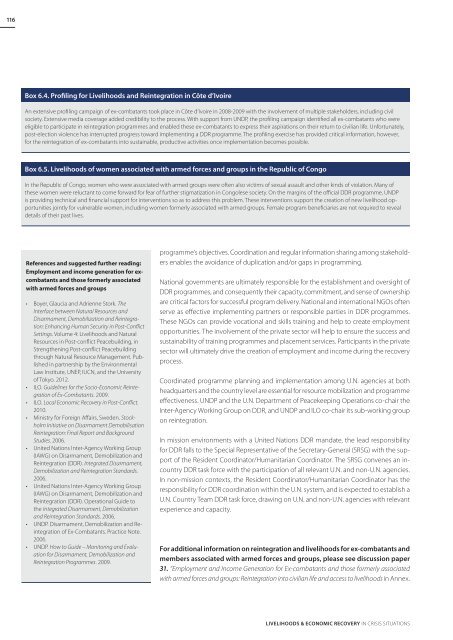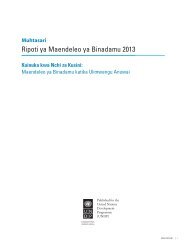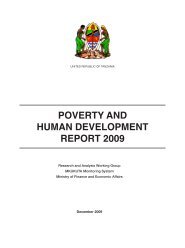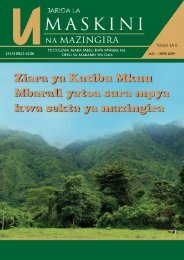Download PDF (4.08 MB) - ReliefWeb
Download PDF (4.08 MB) - ReliefWeb
Download PDF (4.08 MB) - ReliefWeb
You also want an ePaper? Increase the reach of your titles
YUMPU automatically turns print PDFs into web optimized ePapers that Google loves.
116<br />
Box 6.4. Profiling for Livelihoods and Reintegration in Côte d’Ivoire<br />
An extensive profiling campaign of ex-combatants took place in Côte d’Ivoire in 2008-2009 with the involvement of multiple stakeholders, including civil<br />
society. Extensive media coverage added credibility to the process. With support from UNDP, the profiling campaign identified all ex-combatants who were<br />
eligible to participate in reintegration programmes and enabled these ex-combatants to express their aspirations on their return to civilian life. Unfortunately,<br />
post-election violence has interrupted progress toward implementing a DDR programme. The profiling exercise has provided critical information, however,<br />
for the reintegration of ex-combatants into sustainable, productive activities once implementation becomes possible.<br />
Box 6.5. Livelihoods of women associated with armed forces and groups in the Republic of Congo<br />
In the Republic of Congo, women who were associated with armed groups were often also victims of sexual assault and other kinds of violation. Many of<br />
these women were reluctant to come forward for fear of further stigmatization in Congolese society. On the margins of the official DDR programme, UNDP<br />
is providing technical and financial support for interventions so as to address this problem. These interventions support the creation of new livelihood opportunities<br />
jointly for vulnerable women, including women formerly associated with armed groups. Female program beneficiaries are not required to reveal<br />
details of their past lives.<br />
References and suggested further reading:<br />
Employment and income generation for excombatants<br />
and those formerly associated<br />
with armed forces and groups<br />
• Boyer, Glaucia and Adrienne Stork. The<br />
Interface between Natural Resources and<br />
Disarmament, Demobilization and Reintegration:<br />
Enhancing Human Security in Post-Conflict<br />
Settings. Volume 4: Livelihoods and Natural<br />
Resources in Post-conflict Peacebuilding, in<br />
Strengthening Post-conflict Peacebuilding<br />
through Natural Resource Management. Published<br />
in partnership by the Environmental<br />
Law Institute, UNEP, IUCN, and the University<br />
of Tokyo. 2012.<br />
• ILO. Guidelines for the Socio-Economic Reintegration<br />
of Ex-Combatants. 2009.<br />
• ILO. Local Economic Recovery in Post-Conflict.<br />
2010.<br />
• Ministry for Foreign Affairs, Sweden. Stockholm<br />
Initiative on Disarmament Demobilisation<br />
Reintegration: Final Report and Background<br />
Studies. 2006.<br />
• United Nations Inter-Agency Working Group<br />
(IAWG) on Disarmament, Demobilization and<br />
Reintegration (DDR). Integrated Disarmament,<br />
Demobilization and Reintegration Standards.<br />
2006.<br />
• United Nations Inter-Agency Working Group<br />
(IAWG) on Disarmament, Demobilization and<br />
Reintegration (DDR). Operational Guide to<br />
the Integrated Disarmament, Demobilization<br />
and Reintegration Standards. 2006.<br />
• UNDP. Disarmament, Demobilization and Reintegration<br />
of Ex-Combatants. Practice Note.<br />
2006.<br />
• UNDP. How to Guide – Monitoring and Evaluation<br />
for Disarmament, Demobilization and<br />
Reintegration Programmes. 2009.<br />
programme’s objectives. Coordination and regular information sharing among stakeholders<br />
enables the avoidance of duplication and/or gaps in programming.<br />
National governments are ultimately responsible for the establishment and oversight of<br />
DDR programmes, and consequently their capacity, commitment, and sense of ownership<br />
are critical factors for successful program delivery. National and international NGOs often<br />
serve as effective implementing partners or responsible parties in DDR programmes.<br />
These NGOs can provide vocational and skills training and help to create employment<br />
opportunities. The involvement of the private sector will help to ensure the success and<br />
sustainability of training programmes and placement services. Participants in the private<br />
sector will ultimately drive the creation of employment and income during the recovery<br />
process.<br />
Coordinated programme planning and implementation among U.N. agencies at both<br />
headquarters and the country level are essential for resource mobilization and programme<br />
effectiveness. UNDP and the U.N. Department of Peacekeeping Operations co-chair the<br />
Inter-Agency Working Group on DDR, and UNDP and ILO co-chair its sub-working group<br />
on reintegration.<br />
In mission environments with a United Nations DDR mandate, the lead responsibility<br />
for DDR falls to the Special Representative of the Secretary-General (SRSG) with the support<br />
of the Resident Coordinator/Humanitarian Coordinator. The SRSG convenes an incountry<br />
DDR task force with the participation of all relevant U.N. and non-U.N. agencies.<br />
In non-mission contexts, the Resident Coordinator/Humanitarian Coordinator has the<br />
responsibility for DDR coordination within the U.N. system, and is expected to establish a<br />
U.N. Country Team DDR task force, drawing on U.N. and non-U.N. agencies with relevant<br />
experience and capacity.<br />
For additional information on reintegration and livelihoods for ex-combatants and<br />
members associated with armed forces and groups, please see discussion paper<br />
31. “Employment and Income Generation for Ex-combatants and those formerly associated<br />
with armed forces and groups: Reintegration into civilian life and access to livelihoods in Annex.<br />
Livelihoods & Economic Recovery in Crisis Situations





